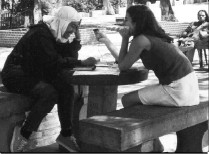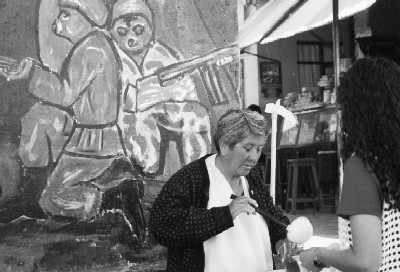 Cochabamba, the third largest city in Bolivia, is bestknown as the "city of eternal spring". But as OscarOlivera, a factory worker and spokesperson for La Coordinadora(the Coalition for the Defence of Water and Life) reminded us at the beginning of the conference, it wasn't the pleasant climate that made this highland city the perfect location for a meeting of grassroots groups from all over the world. The previous year, Cochabamba became a key symbol of the struggle against global capitalism, when tens of thousands of local people took to the streets against the privatisation of their water supply by the US transnational Bechtel... and won!
Cochabamba, the third largest city in Bolivia, is bestknown as the "city of eternal spring". But as OscarOlivera, a factory worker and spokesperson for La Coordinadora(the Coalition for the Defence of Water and Life) reminded us at the beginning of the conference, it wasn't the pleasant climate that made this highland city the perfect location for a meeting of grassroots groups from all over the world. The previous year, Cochabamba became a key symbol of the struggle against global capitalism, when tens of thousands of local people took to the streets against the privatisation of their water supply by the US transnational Bechtel... and won!
Consequently, Cochabamba is a politicised town. As well as graffiti on the walls reading, "the water is ours, damn it!" and the anarcha-feminist graffitti of 'Mujeres Creando', (women creating) murals around the streetsdepict cultural symbols of indigenous resistance - like the coca leaf, an avaricious uncle Sam, and Aymara Indian heroes ("long live the coca leaf, death to the Yankis"). With the conference beginning only days after the attacks on the Twin Towers, local groups of activists set up display boards on the main square, with front page photos of the attacks and slogans such as "Imperialist Yankees: what goes around comes around". Anti-American feeling was very palpable.
The people:
The incredible diversity of groups who make up the PGA network is one of its most striking aspects. Almost 250 people travelled from over 40 countries to the gathering in Bolivia. This included representatives of some of the strongest social movements from all five continents, such as the Ecuadorean peasants confederation (CONFEUNASSC), the Canadian Union of Public Employees (CUPE) and the two hosts of the conference,Six Federations of the Tropics of Cochabamba (the cocagrowersunion), and the National Federation of Domestic Workers of Bolivia (FENAETROB).
From Asia, there were representatives of the Indian National Alliance of People's Movements (NAPM) and of BKU, the national farmers federation, the Movement for National Land and Agricultural Reform from Sri Lanka (MONLAR), and a representative of the Nepali peasants association with over 10 million members.
As a result of visa restrictions and due to a lack of links, there was an obvious under-representation of social movements from both Africa and the Middle East. However, four delegates from the new popular movements in South Africa - landless peasants, the Forum Against Privatisation, and urban struggles against evictions and service cut-offs - were able to make it.
There was also a strong presence of indigenous peoples: Quiché of Guatemala, Kuna of Panama, Mapuche of Chile and Argentina, Quechua and Aymara from the Andean region, Quichua from Ecuador and Maori from Aoteroa.
Many of the Brazilian and Argentinian delegates were from a new network of young, mostly urban organisations that have specifically organised around Global Days of Action such as May 1st or around the Free Trade Area of the Americas. Equivalent in many ways to these groups were those present from Europe, North America and Australia, who have mobilised on the streets of London, Genoa, Barcelona and Davos. Activists came, for example, from Ya Basta! in Italy, theMovement of Global Resistance (MRG) in Catalonia and the Swiss anti-WTO co-ordination.
The mood post-Septmber 11th:
The repressive new world order that the USA has justified by the attack in New York was immediately evident. There had already been some police pressure on people organising the conference, and a visit by Interpol. After the attack, the Bolivian government practically sealed the border for PGA and the governor of the province declared to the press that the PGA delegates were all "potential terrorists" and had organised the riots in Europe and North America. The US ambassador publicly threatened Evo Morales, the leader of the Six Federations of the Tropics of Cochabamba, for havingdared to simultaneously condemn the terrorist attack and the state terrorism practised by the USA in Iraq, Colombia, etc. The first day of the conference was a little tense...
The interviews:
In between long assembly discussions, workshops, mealtimes, bouts of diarrhoea, chicha (local home-brew) drinking and salsa dancing, and on a few hours sleep, we managed to find some time to tape the following interviews. On the first day of the conference, all our recording equipment was stolen. This meant that we weren't able to have conversations with all the women we wanted to. These twelve interviewees are only a handful of the amazing and inspiring women we met in Cochabamba.

1st Picture: Hazel & Mia doing an interview, 2nd: Cochabamba woman serving hot drinks in front of an anti-yankee mural